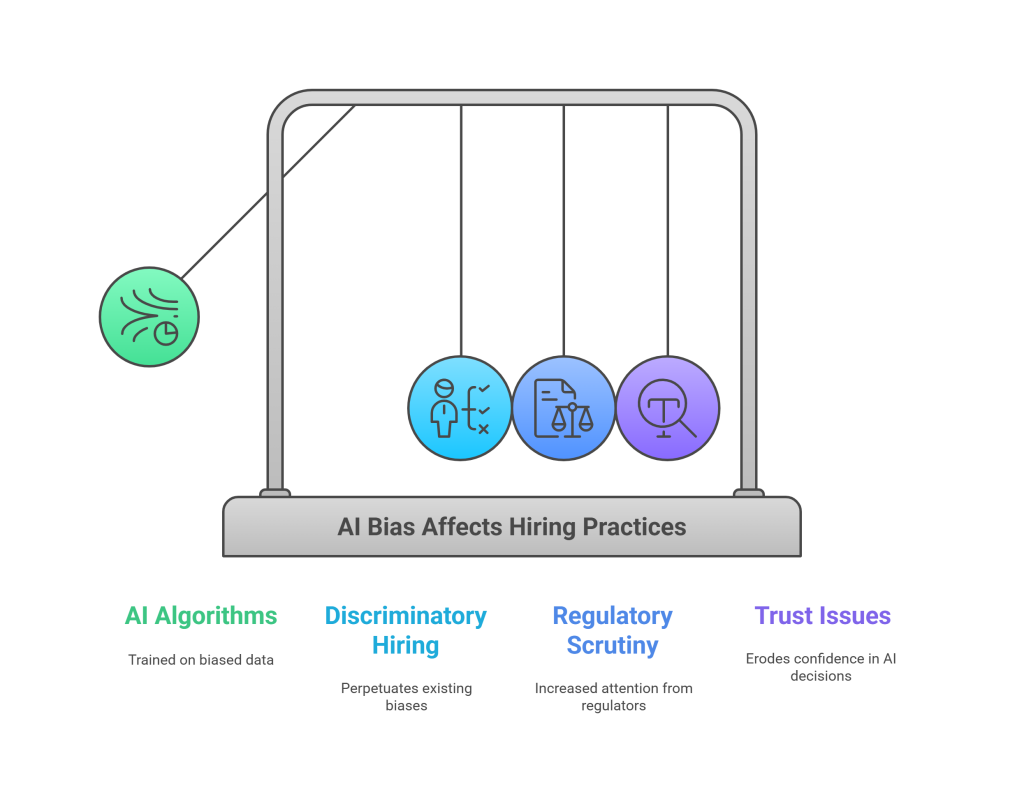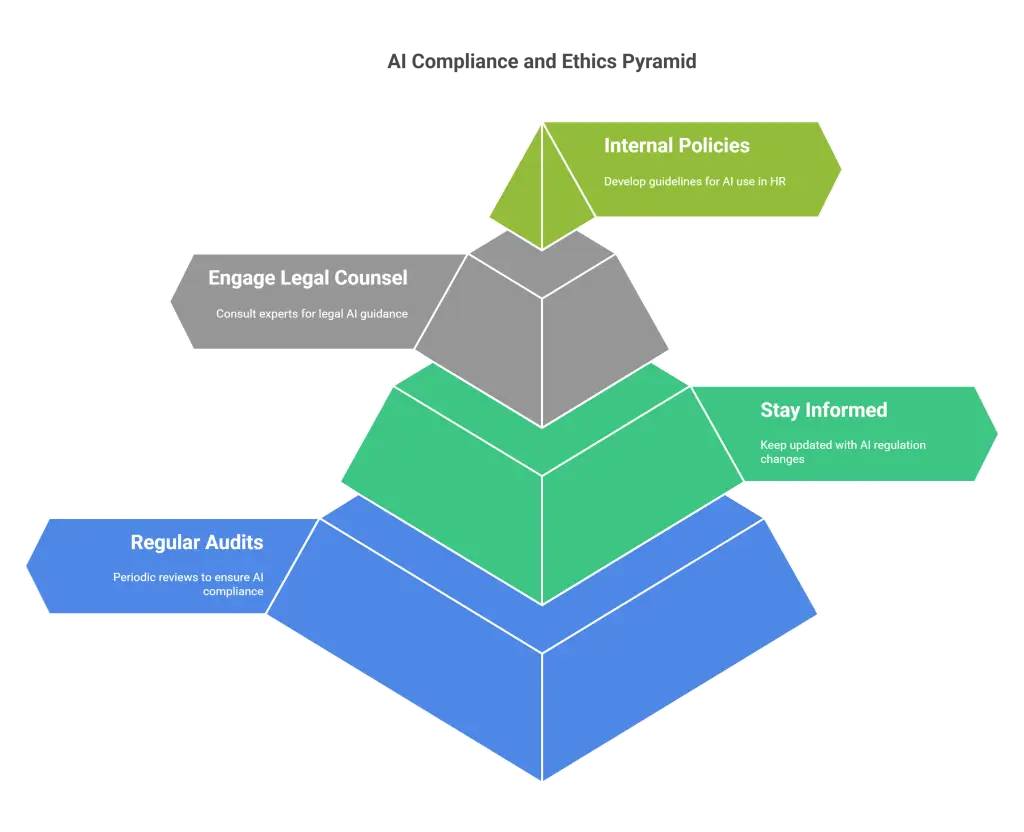In an era where technology evolves quickly, human resource professionals find themselves between innovation and regulation. One area where this tension is palpable is using artificial intelligence (AI) for background checks. AI promises to expedite the hiring process and increase efficiency but also raises significant legal and ethical concerns that are being addressed through emerging regulations.
This blog post provides HR professionals with an overview of the current and upcoming regulations regarding the use of AI in background checks. Understanding these regulations allows you to navigate this complex terrain more effectively and ensure your organization remains compliant.
Key Takeaways
- AI is revolutionizing background checks by enhancing efficiency, accuracy, and consistency in screening processes.
- Machine learning algorithms can quickly analyze vast amounts of data, identifying patterns and potential red flags that human reviewers might miss.
- AI-powered background checks can help reduce bias in hiring decisions by focusing on objective data rather than subjective interpretations.
- While AI offers significant benefits, it's crucial to maintain human oversight to ensure ethical use and address complex situations that require nuanced judgment.
- Companies implementing AI in background checks must stay compliant with relevant regulations and prioritize data privacy and security.
Introduction
Artificial intelligence (AI) is transforming the face of human resources, particularly in background checks. Sophisticated algorithms can now streamline tasks requiring significant manual effort by sifting through mountains of data at lightning speed. But with great power comes great responsibility, and HR professionals navigate a labyrinth of emerging regulations.
This article will explore the new laws and guidelines shaping the use of AI in background checks. By dissecting the current and impending regulatory landscape, we aim to give HR professionals the knowledge they need to stay compliant and effective amid rapid technological advancements.
In today's dynamic regulatory environment, staying updated is not just a best practice but a necessity. For HR professionals, understanding these evolving rules will ensure that AI is used ethically and legally, safeguarding the company's reputation and individuals' rights.
Technology advancement â AI, in particular â is a game-changer in our approach to background checks. TheâÂÂpotential for improved efficiency and objectivity is exciting. On the otherâÂÂhand, it demands a delicate balance between innovation and ethics. While AI can help us efficiently navigate large volumes of data and identify possible risks, itâÂÂrequires human intervention. I believe that there is great potential in human and AI integration, and that could make an impact. BothâÂÂelements deserve to be connected while having a balance between the heart and the mind.
The Role of AI in Background Checks
AI in background checks has quickly evolved from a theoretical concept to a practical tool many organizations use today. AI uses machine learning, natural language processing, and data analytics to automate background checks. This includes scanning resumes, analyzing social media, verifying employment history, and predicting candidate behavior.
Benefits
The benefits of utilizing AI in background checks are clear and compelling. First and foremost, speed is a significant advantage. Traditional background checks can take days if not weeks. AI can process vast amounts of information in a fraction of the time, significantly reducing the hiring cycle.
AI systems provide critical benefits such as accuracy and cost-effectiveness. They meticulously parse data to ensure no critical details are overlooked and require substantially lower resources compared to traditional methods.
Challenges
However, these benefits don't come without challenges. One of the most significant issues is bias. AI algorithms are only as good as the data they're trained on. If the training data reflects human biases, the AI will likely perpetuate these biases, potentially leading to discriminatory hiring practices. This risk has garnered the attention of regulators and has become a focal point in emerging legislation.

Given the need for large amounts of personal data, data privacy is a major concern for AI systems. Ensuring compliance with privacy laws across different jurisdictions is a complex task.
AI operates as a "black box" in many cases, making it difficult for HR professionals and candidates to understand how decisions are being made. This lack of transparency can lead to distrust and legal complications, emphasizing the need for robust regulatory frameworks and ethical guidelines. Addressing issues like bias, data privacy, and transparency is crucial for leveraging AI effectively and ethically in the hiring process.
In summary, while AI in background checks offers time savings, cost reductions, and improved accuracy, it also brings challenges that must be thoughtfully managed. Addressing issues like bias, data privacy, and transparency is crucial for leveraging AI effectively and ethically in the hiring process.

Current Regulatory Landscape (United States, European Union, Other Regions)
United States
Federal Regulations
In the U.S., AI usage in background checks primarily falls under the purview of longstanding federal laws. The Fair Credit Reporting Act (FCRA) is critical here, as it governs consumer information's accuracy, fairness, and privacy. HR professionals using AI for background checks must comply with the FCRA and EEOC guidelines to ensure consent, data accuracy, and non-discrimination in hiring practices.
State Regulations
State-specific laws further complicate the regulatory landscape. For example, CaliforniaâÂÂs Consumer Privacy Act (CCPA) imposes stringent data privacy requirements that impact how AI systems manage personal data. Under CCPA, candidates have the right to know what personal data is being collected and request to delete their data. This adds an extra layer of compliance for any AI-driven background check system operating within California. Similarly, other states are developing their regulationsâÂÂNew York, Illinois, and Texas, for instance, each have unique statutes addressing data privacy and discrimination, demanding that HR professionals stay alert and adaptive.
European Union
General Data Protection Regulation (GDPR)
Across the Atlantic, the General Data Protection Regulation (GDPR) sets the gold standard for data protection and privacy, significantly affecting the use of AI in background checks. GDPRâÂÂs rigorous guidelines require organizations to obtain explicit consent from candidates when processing personal data and to be transparent about their data use practices. AI systems must be designed to comply with GDPR's principles of data minimization and purpose limitation, ensuring that only necessary data is processed and only for specific, legitimate purposes. The regulation also grants individuals the right to access, rectify, and erase their data and object to automated decision-making, including profiling. This necessitates that AI tools used in background checks have robust mechanisms for user control and data management.
Other Regions
Other regions globally are also advancing their regulatory frameworks concerning AI and background checks. In Canada, the Personal Information Protection and Electronic Documents Act (PIPEDA) mirrors many principles of GDPR, emphasizing consent, data accuracy, and accountability. Meanwhile, AustraliaâÂÂs Privacy Act requires organizations to take reasonable steps to protect personal information, ensuring that AI systems are secure and that individuals know how their data is used. These regulations highlight a growing international trend towards greater oversight and protective measures in deploying AI technologies in HR practices.
By understanding and navigating these regulatory landscapes, HR professionals can ensure that their AI-driven background checks are efficient, innovative, legally compliant, and ethically sound.
Emerging Regulations and Guidelines
With the quick advancement of AI technology, regulations are increasingly being proposed to ensure that its application, especially in sensitive areas like background checks, adheres to ethical standards and legal requirements. HereâÂÂs a rundown of whatâÂÂs on the horizon:
Proposed U.S. Legislation
One key legislative proposal to watch is the Algorithmic Accountability Act. This proposed bill requires companies to conduct impact assessments of their automated decision systems. These assessments would evaluate the potential for bias, accuracy, fairness, and potential discriminatory effects, forcing companies to be more transparent and accountable for their AI systems. If passed, this legislation could become a cornerstone in shaping the future use of AI in background checks.
International Trends
Globally, there is a growing movement toward more stringent regulations concerning AI, which could influence U.S. policies down the line. For instance, the European Union is deliberating on the Artificial Intelligence Act, which introduces a risk-based framework for AI applications, including mandatory requirements and standards for high-risk AI systems. Similarly, countries like Canada and Australia are exploring comprehensive AI regulations that stress the importance of human oversight and accountability.
In Asia, countries such as Singapore and South Korea are laying down frameworks to ensure that AI systems are ethical and transparent, which may set a precedent for regulatory practices worldwide.
Industry Standards
Beyond governmental regulations, industry standards and guidelines are also evolving to address the ethical and legal complexities of using AI in background checks. Organizations such as the Professional Background Screening Association (PBSA) have proactively set guidelines emphasizing fairness, accuracy, and compliance. These industry standards often serve as a practical benchmark, helping companies self-regulate while waiting for more formal legislation to catch up.
Standards like these are particularly crucial as they often fill gaps left by regulations, offering immediate and actionable guidelines that companies can adopt to ensure compliance and maintain best practices.
In summary, while specific regulations are emerging, HR professionals should stay vigilant and adaptable. Proactively understanding and implementing these guidelines will keep companies compliant and foster a more ethical and transparent use of AI in the hiring process.
Ethical Considerations
Bias and Fairness
AI in background checks can inadvertently perpetuate existing biases if not carefully managed. AI models often rely on historical data to make predictions, and if these datasets are biased, the AI can replicate and even magnify those biases. For example, if past hiring data favored certain demographics over others, the AI could lean toward those groups and discriminate against equally qualified candidates from underrepresented communities. Regulations are increasingly targeting these issues by mandating transparency and fairness audits. The Equal Employment Opportunity Commission (EEOC) provides guidelines to minimize bias in AI algorithms, pushing HR professionals to assess and train their AI tools for unbiased decision-making rigorously.
Transparency
Transparency in AI decision-making processes is not just a best practice; it's becoming a regulatory requirement. Knowing how an AI system arrives at a decision is critical for ethical and legal reasons. Potential hires have the right to understand the factors that influenced their hiring decision, which means HR professionals must ensure their AI tools are explainable. This implies having clear documentation on how the AI operates and providing this information can be easily communicated to candidates. Regulations like the General Data Protection Regulation (GDPR) in the EU already emphasize the necessity of transparency, and similar trends are being seen in U.S. federal and state legislation.
Accountability
Regulations increasingly demand accountability from AI developers and those who deploy these technologies in hiring processes. When AI tools make decisions that impact people's lives, it's crucial that someone can be held responsible for those decisions. This involves establishing clear organizational roles and responsibilities for monitoring and maintaining AI systems. HR professionals must work with legal experts and IT departments to ensure compliance and promptly address any issues. Additionally, industry standards, such as those from the Professional Background Screening Association (PBSA), recommend regular audits and compliance checks to ensure the AI behaves as expected and adheres to ethical guidelines.
Best Practices for Compliance

Conduct Regular Audits
First and foremost, make regular audits a priority. Review your AI systems periodically to ensure they function as intended and meet all compliance requirements. This involves checking for accuracy, fairness, and adherence to privacy standards. DonâÂÂt rely on a one-time setup; continuous monitoring and adjustment are key to staying compliant and minimizing risks.
Stay Informed
Regulations surrounding AI and background checks are continually evolving. Make it a habit to stay informed by following updates from regulatory bodies, industry groups, and legal advisories. Subscribe to newsletters, attend webinars, or join professional networks related to HR and AI ethics. Knowledge is your best tool for navigating this complex landscape.
Engage Legal Counsel
Consulting with legal experts specializing in AI and employment law can help you navigate the maze of regulations. These professionals can provide tailored advice based on your specific circumstances, assist in interpreting new rules, and ensure that your processes align with current legal standards. Legal counsel is an investment in safeguarding your company against potential legal setbacks.
Internal Policies
Develop and continually update your internal policies to align with emerging regulations. Ensure your guidelines clearly outline the use of AI in background checks, including protocols for data privacy, bias mitigation, and decision transparency. Regularly train your HR team on these policies to ensure everyone is on the same page about compliance expectations.
By implementing these best practices, HR professionals can responsibly leverage AI in background checks, ensuring regulatory compliance and ethical integrity.
Key Takeaways
Summary of Regulations
Navigating the landscape of AI in background checks involves understanding key regulations like the Fair Credit Reporting Act (FCRA) in the United States, which governs how background information is collected and used. State-specific laws such as California's Consumer Privacy Act (CCPA) introduce additional layers of regulation, especially concerning data privacy. Internationally, the General Data Protection Regulation (GDPR) in the European Union sets a high standard for data protection, impacting any organization dealing with EU citizens' data. These regulations collectively aim to ensure fairness, transparency, and accountability in using AI.
Actionable Steps
HR professionals must take tangible steps to ensure compliance:
- Conduct Regular Audits: Review AI systems for fairness and compliance with existing laws.
- Stay Informed: Keep up-to-date with regulatory changes and industry best practices.
- Engage Legal Counsel: Consult legal experts to navigate complex regulations and mitigate risks.
- Internal Policies: Develop and update internal guidelines to align with current and emerging regulations.
Through these actionable steps,âÂÂHR professionals not only ensure compliance but also build trust in the organization and among candidates. Identifying potential problems early whenâÂÂthey arise via audits and monitoring will also reduce any legal risks. Seeking legal counsel to keep the organization informedâÂÂon the latest regulations will save the company from costly errors. This empowers HR professionals to gracefully handle any concerns by balancing the benefits of both AI and our commitment to ethical, compliant practiceâÂÂfor a more open and effective hiring process.
Looking Ahead
The regulatory environment surrounding AI in background checks is evolving. Anticipate additional scrutiny and legislation to mitigate bias, enhance transparency, and enforce accountability. Staying ahead of these changes will ensure compliance and foster a more ethical and efficient hiring process. As technology continues to evolve, so will the standards governing its use, making vigilance and adaptability key competencies for HR professionals moving forward.
Conclusion
Understanding and complying with AI regulations regarding background checks isn't just a legal obligationâÂÂit's a critical component of fair and effective HR practices. As AI continues transforming the hiring process, staying updated on regulatory changes is more important than ever.
HR professionals should proactively assess their current AI systems, identify potential compliance gaps, and adapt to new regulations as they emerge. This not only safeguards your organization from legal pitfalls but also upholds ethical standards that promote fairness and transparency in hiring.
So, take action now. Conduct regular audits, engage with legal experts, and implement robust internal policies that align with evolving regulations. By doing so, you not only ensure compliance but also contribute to a more just and equitable hiring landscape.
Additional Resources
Navigating the intricate landscape of AI regulations in background checks is no small feat. To help you stay ahead, we've compiled a list of resources that provide valuable insights and guidance.
- Explore resources from The Professional Background Screening Association for industry guidelines and updates. PBSA offers a wealth of knowledge on best practices, compliance, and emerging trends in the background screening industry.
- Review the Fair Credit Reporting Act (FCRA) guidelines to ensure your practices meet federal requirements.
- Understand the implications of California's Consumer Privacy Act (CCPA) for AI-driven background checks.
- Stay updated on General Data Protection Regulation (GDPR) standards if you are handling data from the European Union.
- Keep an eye on Algorithmic Accountability Act developments, which could significantly impact AI use in hiring and background checks soon.
By leveraging these resources, you can stay informed about the latest developments, guidelines, and best practices, ensuring your use of AI in background checks is ethical and compliant.

GCheck Editorial Team
Meet the GCheck Editorial Team, your trusted source for insightful and up-to-date information in the world of employment background checks. Committed to delivering the latest trends, best practices, and industry insights, our team is dedicated to keeping you informed.
With a passion for ensuring accuracy, compliance, and efficiency in background screening, we are your go-to experts in the field. Stay tuned for our comprehensive articles, guides, and analysis, designed to empower businesses and individuals with the knowledge they need to make informed decisions.
At GCheck, we're here to guide you through the complexities of background checks, every step of the way.





